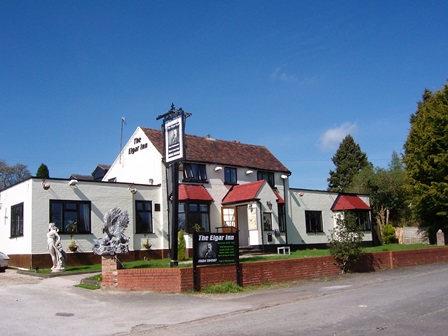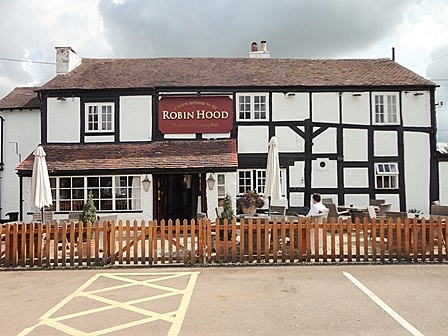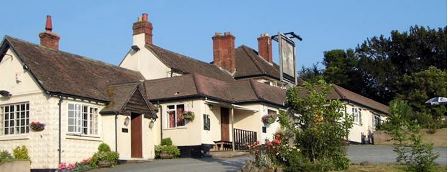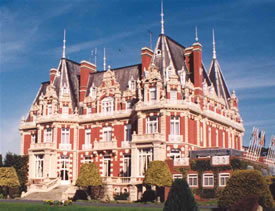Worcestershire Tourist Guide - Articles
Famous Worcestershire People
EDWARD ELGAR
Born in Lower Broadheath on 2nd June 1857 - Died February 23rd 1934 in Worcester.
English Composer.
Sir Edward Elgar was inspired by the Malvern Hills to write many of his most famous works including the Enigma Variations the Pomp and Circumstance Marches, The Dream of Gerontius, Caractus, and Cockaigne. He also composed oratorios, chamber music, symphonies, instrumental concertos, and songs.
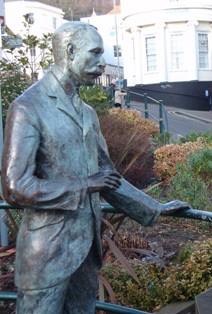
After his death his birthplace in Lower Broadheath was made into a museum by his daughter, and now houses a unique collection of personal effects, including the desk at which Elgar composed much of his music.Visit Website
STANLEY BALDWIN
Born in Bewdley, Worcestershire in 1857 - Died in 1947.
English Conservative politician and Prime Minister.
Educated at Cambridge and became vice-chairman of his family’s iron and steel business. An MP in 1906, he became President of the Board of Trade in 1921, and then unexpectedly succeeded Bonar Law as Prime Minister in 1923. His period in office included the General Strike (1926), the Ramsay MacDonald Coalition (1931-35), and Edward VIII’s abdication (1936).
A. E. HOUSEMAN
Born in Fockbury, Worcestershire in 1859 - Died in 1936.
A.E. Housman was born in Fockbury, Worcestershire. He went to Bromsgrove School where he won prizes for his poetry and lived in Bromsgrove. He was moved to write about Worcestershire in his poem “Bredon Hill” taken from his most famous work “A Shropshire Lad”. He is considered to be one of the greatest classical scholars that this country has ever produced.
WILLIAM RICHARD MORRIS
Born in Worcester in 1877 - Died in 1963
William Morris, later Lord Nuffield, creator of the Morris motor car, was born in Worcester and also linked to Droitwich Spa. This generous philanthropist was claimed by the town as one of their own when he was made an honorary freeman of Droitwich Spa in 1951.
Morris worked in Oxford, first as a repairer and maker of bicycles, then of motor cycles and finally of cars. Founding his business in Oxford, he produced his first 400 Morris cars at Cowley. When the First World War broke out, he devoted the factory to the war effort, but later proved that affordable, mass-produced vehicles were what the public wanted, with production reaching 65,000 cars per year. He was one of the first British industrialists to introduce mass production methods. His company, Morris Motors Ltd, prospered in the years after the First World War. From the first Morris Oxford of 1913 to the still familiar post-war Morris Minor, his Morris and MG cars were known around the world.
Morris was made a Baron in 1934 and finally a Viscount in 1938. He also took the name of Nuffield, the Oxfordshire village where he lived. Morris made many donations, often to local hospitals, and helped to fund research by Alexander Fleming, which led to the discovery of penicillin. Lord Nuffield devoted his energies in later life to the philanthropy that made him a household name.
The Nuffield Foundation now has a diversified portfolio of investments worth around £220m, with an annual income of £8m. Lord Nuffield gave his Foundation wide objectives and the focus of the Foundation's work has varied over its history. The funds are now used mainly to advance self-contained projects or support social welfare, often by means of research or practical innovation.
JOHN CORBETT
Born in 1817 - Died in 1901
John Corbett was a native of the Black Country, being born at Brierley Hill in 1817, the son of Joseph, a prominent owner and operator of canal boats.
John Corbett, was also known as ‘The Salt King’, he owned a thriving salt works on the banks of the Worcester and Birmingham Canal at Stoke Prior, near Droitwich Spa. He revolutionised the commercial manufacture of salt through his discovery of extracting it from beneath the ground by pumping in large volumes of water and sucking out the resultant brine. Corbett then used giant evaporating pans to separate the salt from the water. Corbett was a philanthropic employer and did much to improve the working and living conditions for his employees as testified by a stained glass window in St Michael's Church, Stoke Prior, that was paid for by local folk.
Corbett, who was also MP for Droitwich Spa and Mid Worcestershire,he amassed a fortune from his works at Stoke Prior and sold his business to the Salt Union Ltd for £660,000 in 1888.
He built himself a grand house near Droitwich Spa called 'Chateau Impney', now a hotel and conference centre.
Corbett also bought St. Andrew's House and turned it into The Raven Hotel and built the Worcestershire Brine Baths Hotel, both in Droitwich Spa.
Corbett’s influence can also be found in the almshouses 'for decayed salt makers' at nearby Wychbold. He also paid for the re-building of Droitwich Spa railway station and made numerous other gifts including the rebuilding of the church at Stoke Prior.
John Corbett died in 1901 and is buried in the churchyard at St Michael's in Stoke Prior.
SIR ROWLAND HILL
Born in Kidderminster in 1795 - died in 1879
Rowland Hill invented the prepaid postage stamp. He was an important Victorian reformer who wanted to improve living conditions for everyone. This included making it possible for all people to be able to afford to send letters to their friends and families
He believed that if more people were able to send letters, then more people would learn to read and write which would greatly improve their lives.
In 1837 he wrote an important booklet called Post Office Reform. He wanted to change the way people paid for postage. People used to have to pay a certain amount depending on how many sheets of paper they used and how far the letter travelle, this was very expensive.
Rowland wanted to make postage cheaper, so that people paid for the letter by weight. His idea was that it should only cost one penny to send a letter. This would normally be paid for by the person who sent the letter.
In 1839 he was asked to oversee the work of introducing the world’s first postage stamp. The stamp was called the Penny Black and went on sale in 1840.
Rowland Hill also did a lot more than just introduce the postage stamp. In 1846 he became the Secretary to the Postmaster General. Then in 1854 he became the Secretary to the whole Post Office oragnisation. This meant he could make bigger changes such as introducing the Post Office Savings Bank to encourage all people to save.
Rowland Hill died in 1879 and was buried in Westminster Abbey in London - a great honour and a mark of how important his work had been. His ideas still have an impact on how we live today.
Born in Lower Broadheath on 2nd June 1857 - Died February 23rd 1934 in Worcester.
English Composer.
Sir Edward Elgar was inspired by the Malvern Hills to write many of his most famous works including the Enigma Variations the Pomp and Circumstance Marches, The Dream of Gerontius, Caractus, and Cockaigne. He also composed oratorios, chamber music, symphonies, instrumental concertos, and songs.
After his death his birthplace in Lower Broadheath was made into a museum by his daughter, and now houses a unique collection of personal effects, including the desk at which Elgar composed much of his music.Visit Website
STANLEY BALDWIN
Born in Bewdley, Worcestershire in 1857 - Died in 1947.
English Conservative politician and Prime Minister.
Educated at Cambridge and became vice-chairman of his family’s iron and steel business. An MP in 1906, he became President of the Board of Trade in 1921, and then unexpectedly succeeded Bonar Law as Prime Minister in 1923. His period in office included the General Strike (1926), the Ramsay MacDonald Coalition (1931-35), and Edward VIII’s abdication (1936).
A. E. HOUSEMAN
Born in Fockbury, Worcestershire in 1859 - Died in 1936.
A.E. Housman was born in Fockbury, Worcestershire. He went to Bromsgrove School where he won prizes for his poetry and lived in Bromsgrove. He was moved to write about Worcestershire in his poem “Bredon Hill” taken from his most famous work “A Shropshire Lad”. He is considered to be one of the greatest classical scholars that this country has ever produced.
WILLIAM RICHARD MORRIS
Born in Worcester in 1877 - Died in 1963
William Morris, later Lord Nuffield, creator of the Morris motor car, was born in Worcester and also linked to Droitwich Spa. This generous philanthropist was claimed by the town as one of their own when he was made an honorary freeman of Droitwich Spa in 1951.
Morris worked in Oxford, first as a repairer and maker of bicycles, then of motor cycles and finally of cars. Founding his business in Oxford, he produced his first 400 Morris cars at Cowley. When the First World War broke out, he devoted the factory to the war effort, but later proved that affordable, mass-produced vehicles were what the public wanted, with production reaching 65,000 cars per year. He was one of the first British industrialists to introduce mass production methods. His company, Morris Motors Ltd, prospered in the years after the First World War. From the first Morris Oxford of 1913 to the still familiar post-war Morris Minor, his Morris and MG cars were known around the world.
Morris was made a Baron in 1934 and finally a Viscount in 1938. He also took the name of Nuffield, the Oxfordshire village where he lived. Morris made many donations, often to local hospitals, and helped to fund research by Alexander Fleming, which led to the discovery of penicillin. Lord Nuffield devoted his energies in later life to the philanthropy that made him a household name.
The Nuffield Foundation now has a diversified portfolio of investments worth around £220m, with an annual income of £8m. Lord Nuffield gave his Foundation wide objectives and the focus of the Foundation's work has varied over its history. The funds are now used mainly to advance self-contained projects or support social welfare, often by means of research or practical innovation.
JOHN CORBETT
Born in 1817 - Died in 1901
John Corbett was a native of the Black Country, being born at Brierley Hill in 1817, the son of Joseph, a prominent owner and operator of canal boats.
John Corbett, was also known as ‘The Salt King’, he owned a thriving salt works on the banks of the Worcester and Birmingham Canal at Stoke Prior, near Droitwich Spa. He revolutionised the commercial manufacture of salt through his discovery of extracting it from beneath the ground by pumping in large volumes of water and sucking out the resultant brine. Corbett then used giant evaporating pans to separate the salt from the water. Corbett was a philanthropic employer and did much to improve the working and living conditions for his employees as testified by a stained glass window in St Michael's Church, Stoke Prior, that was paid for by local folk.
Corbett, who was also MP for Droitwich Spa and Mid Worcestershire,he amassed a fortune from his works at Stoke Prior and sold his business to the Salt Union Ltd for £660,000 in 1888.
He built himself a grand house near Droitwich Spa called 'Chateau Impney', now a hotel and conference centre.
Corbett also bought St. Andrew's House and turned it into The Raven Hotel and built the Worcestershire Brine Baths Hotel, both in Droitwich Spa.
Corbett’s influence can also be found in the almshouses 'for decayed salt makers' at nearby Wychbold. He also paid for the re-building of Droitwich Spa railway station and made numerous other gifts including the rebuilding of the church at Stoke Prior.
John Corbett died in 1901 and is buried in the churchyard at St Michael's in Stoke Prior.
SIR ROWLAND HILL
Born in Kidderminster in 1795 - died in 1879
Rowland Hill invented the prepaid postage stamp. He was an important Victorian reformer who wanted to improve living conditions for everyone. This included making it possible for all people to be able to afford to send letters to their friends and families
He believed that if more people were able to send letters, then more people would learn to read and write which would greatly improve their lives.
In 1837 he wrote an important booklet called Post Office Reform. He wanted to change the way people paid for postage. People used to have to pay a certain amount depending on how many sheets of paper they used and how far the letter travelle, this was very expensive.
Rowland wanted to make postage cheaper, so that people paid for the letter by weight. His idea was that it should only cost one penny to send a letter. This would normally be paid for by the person who sent the letter.
In 1839 he was asked to oversee the work of introducing the world’s first postage stamp. The stamp was called the Penny Black and went on sale in 1840.
Rowland Hill also did a lot more than just introduce the postage stamp. In 1846 he became the Secretary to the Postmaster General. Then in 1854 he became the Secretary to the whole Post Office oragnisation. This meant he could make bigger changes such as introducing the Post Office Savings Bank to encourage all people to save.
Rowland Hill died in 1879 and was buried in Westminster Abbey in London - a great honour and a mark of how important his work had been. His ideas still have an impact on how we live today.










